[January] [February] [March] [April] [May] [June] [July] [August] [September] [October] [November] [December]
January 3rd, 1928
The BBC broadcast an all Haydn Wood concert. Wood
himself conducts the Wireless Orchestra in A May-Day
Overture, Variations on a Once Popular Humorous Song,
suite Three Famous Pictures, entr'actes Heather
Bells and Thistledown, and A Southern
Rhapsody, Virginia. Soprano Megan Thomas sings A
Brown Bird Singing, Bird of Love Divine, I
Think of You My Sweet and It Is Only a Tiny Garden.
Baritone Rex Palmer sings Ship o' Mine, The Sea
Road, Town and Country and Casey the
Fiddler.
January 4th, 1941
Haydn Wood thinks of composing a light opera based
on Charles Kingsley's novel Westward Ho!, in the line
of Merrie England, a comic opera by Edward German
(1902), and The Rebel Maid, a romantic light opera by
Phillips Montague Fawcett (1921). Westward Ho! is a
British historical novel which was published in 1855. Wood lives
in Westward Ho! (Devon), a seaside town which was named after
the book.
January 6th, 1945
Haydn Wood has just received from Stanford Robinson
a long list of scores that he requires for the BBC "Sunday
Rhapsody" concert that he will conduct on January 14th. Wood is
able to send right away the scores he happens to have at hand.
And he immediately writes to the various publishers to ask them
to send to Robinson what is available. Wood ends his letter to
Robinson with a P.S.: 'This is the 7th letter I have written
without stopping re this broadcast and I am getting a bit
addled.'
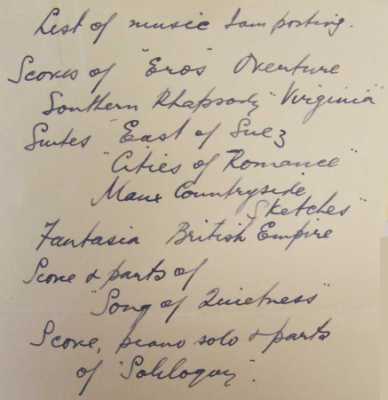
January 7th, 1935
Haydn Wood goes to His Master's Voice Abbey Road
studios, London, to conduct the Light Symphony Orchestra in a
recording of his own arrangements of Four Edward Elgar
Songs (Like to the Damask Rose, Queen
Mary's Song, Rondel op. 16 No.3, Shepherd's
Song op. 16 No.1) and, at Elgar's request, he also
conducts the recording of Elgar's short piece Mina.
January 10th, 1943
Haydn Wood composed A Manx Pastoral Scene
for orchestra in October 1942. He arranges it for oboe and
dedicates it to oboist Leon Goosens.
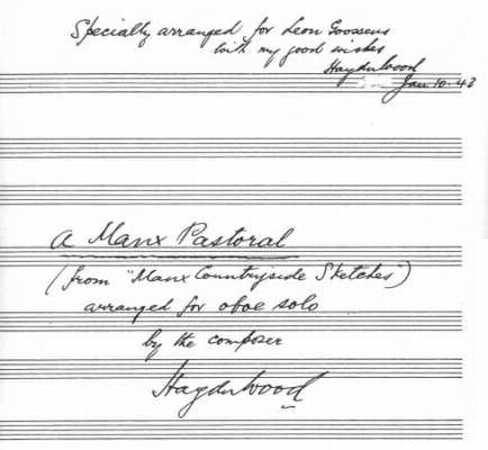
January 11th, 1941
Haydn Wood thinks of americanizing the words of the
song edition of Torch of Freedom for the United
States market. He writes to his publisher Leslie Boosey: 'They
are as keen on freedom as we are, and when they join us short of
nothing (which I think they will eventually), it might prove a
success there.'
January 13th, 1943
Haydn Wood listens to Stanford Robinson's "Reverie"
programme on the BBC, including the first broadcast of A
Manx Pastoral Scene.
January 15th, 1934
Haydn Wood writes to the BBC to complain about a
misprint in the Radio Times. His Prelude which will be
broadcast on January 19th is attributed to Haydn without the
Wood in the programme of this week's issue. 'If you would kindly
notify the announcer of the error and also credit me as composer
in your record of performances I shall be greatly obliged.'
January 16th, 1940
Haydn Wood conducts a broadcast from Bristol of Apache
Life (from his suite Paris). The programme
entitled "Let Her Go, Professor!" is devoted to the stories of
famous musical directors. Wood is among the conductors who
conduct the Augmented BBC Variety Orchestra in their own
compositions.
January 18th, 1894
Harry Wood's Operatic Concert at the Grand Theatre,
Douglas, Isle of Man. Haydn's brother Harry conducts the Douglas
Philharmonic Society Orchestra. Master Haydn Wood sits in the
second violin section.
January 22nd, 1917
Anthony's Dilemma opens at the Grand,
Birmingham. It is produced by Oswald Marshall. The words by
Harold Simpson have been set to music by Haydn Wood. This
musical sketch tells how a Spanish singer who has lost the key
of her own flat, finds help from the occupant next door who is
an old flame. The meeting revives tender emotions. Amusing
complications ensue through the appearance of the occupant's
wife. Madame Ratmirova, the Russian prima donna is the central
figure in the sketch. She has a dainty waltz song, Life Is
a Dream of Delight, and two tuneful duets with her old
lover (Harold Thorley), Ten Years Ago and Sad Is
My Heart. Anthony's Dilemma has a descriptive
addendum to the title: 'a musical incident in two flats and one
key'.
January 23rd, 1946
Haydn Wood dedicates a print of A Bell for
Adano, An Impression for piano solo to his sisters Elise
and Adeline.
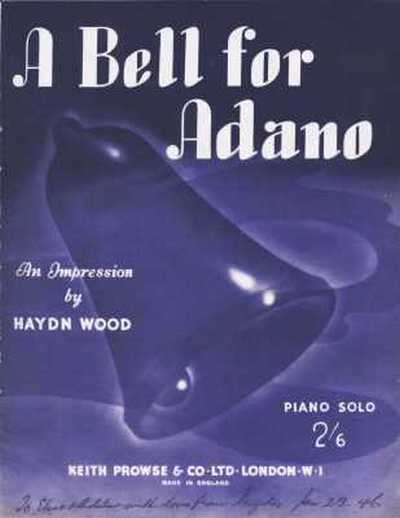
January 24th, 1929
Haydn Wood submits to the BBC a programme which
consists of the compositions of three brothers, Harry, Daniel
and Haydn: 'My brother Harry is well-known as a conductor and
composer to your North country audiences, and my brother Daniel
was an eminent flautist, being professor of that instrument at
the Royal College of Music and the Royal Academy; and in
addition an original member and director of the London Symphony
Orchestra. He also achieved considerable success as a
song-writer, his Garden of Happiness being extremely
popular. He also wrote flute solos.' Haydn's suggestion will
receive the BBC's careful attention. They will decide, however,
that it might be more generally popular to give another concert
of Haydn Wood's music alone.
January 25th, 1920
A busy Sunday: Haydn Wood and Dorothy Court set a
record performing together in three Sunday League Concerts in
London, at the Palladium, the Alhambra and the Camberwell
Palace.
January 26th, 1938
Haydn Wood, Dorothy Court and Haydn's nephew Hilton
Cullerne arrive at Douglas, Isle of Man, for the Annual Dinner
of the Ellan Vannin Club. Haydn's brother Harry Wood is the
President of the Club.
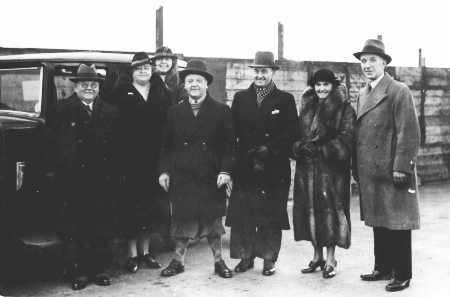
Left to right: Harry Wood, Dorothy Court, Adeline Wood, Haydn Wood, Hilton Cullerne and friends Mrs. and Mr. McEvoy.
January 27th, 1898
This afternoon, pupils of the Royal College of
Music give a performance of Mozart opera's Don Giovanni
at the Lyceum Theatre, London. The conductor is Charles Villiers
Stanford. In act 1, Haydn Wood plays the
violin on stage in a small string orchestra.
January 29th, 1925
Haydn Wood agrees to subscribe the sum of £100 for
the production and running expenses of the play No No
Nanette which Herbert Clayton & Jack Waller propose
to produce at the Palace Theatre, London.
January 30th, 1949
Haydn Wood hears on radio a song which he composed
in 1934, Memories of Yesterday. He writes to Douglas
Lawrence, the BBC Light Music Supervisor, that it would make a
good title for a broadcast series of old melodies. 'If you think
anything of the idea, there is the ready-made signature tune for
you.'
January 31st, 1924
Haydn Wood agrees to compose all music necessary
for the conversion of a comedy Mice and Men by
Madeleine Lucette Ryley into a musical play (provisionally
entitled Little Britain). The producer is Wilfred
Cotton.
[January] [February] [March] [April] [May] [June] [July] [August] [September] [October] [November] [December]
February 2nd, 1937
The BBC broadcast a programme of Haydn Wood's
compositions played by Reginald Foort at the BBC Theatre Organ.
Wood writes to Reginald Foort:
February 3rd, 1931
Haydn Wood agrees that Chappell publish the songs Roses
of
Picardy, Love's Garden of Roses and It Is
Only a Tiny Garden together in an album in their
Celebrity Series of World Famous Ballads.
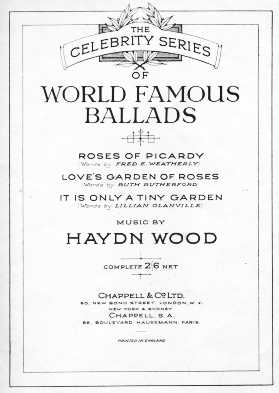
February 7th, 1906
Soprano Dorothy Court gives a concert this
afternoon at the Æolian Hall, London. Haydn Wood as a violinist
plays the andante from Édouard Lalo's Symphonie espagnole
and a Brahms Hungarian Dance arranged by Joachim. They
are accompanied by Herbert L. Cooke at the piano.
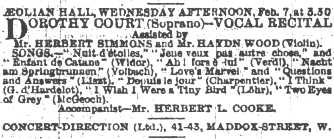
February 8th, 1906
Haydn Wood with Madame Albani's Concert Party
boards the Numidian. They sail from Liverpool to Halifax,
Canada. The soprano and her Company will tour Canada from East
to West until June.
February 9th, 1904
Haydn Wood is the concertmaster in a series of five
performances starting today of The Babes in the Woods,
at the Gaiety Theatre, Douglas, Isle of Man. Haydn's brother
Harry conducts the orchestra. Their sister Adeline has invented
the dances. The whole production is under the personal
supervision of Harry Wood.
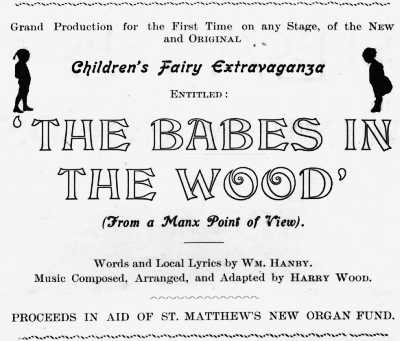
February 10th, 1899
Soprano Madame Albani gives a Grand Evening Concert
at the Queen's Hall, London, with the Orchestra of the Royal
College of Music conducted by Charles Villiers Stanford.
Standford's Te Deum is given its first London
performance. Haydn Wood plays in the first violins section of
the orchestra.
February 13th, 1928
Haydn Wood plays as a violin soloist in a BBC
Ballad Concert transmitted from London. He performs his
arrangement of Oh! That We Two Were Maying by
Ethelbert Woodbridge Nevin, a Scene de la Csarda by
Jeno Hubay, his own Slumber Song and variations of his
composition.
February 14th, 1953
The St. Pancras Old Time Dance Club holds a dance
at the Willes Hall, Kentish Town, London. Haydn Wood, along with
Dorothy, is invited to attend the dance as guest of honour. Club
member Patrick Knight sings Wood's Coronation ballad Elizabeth
of England accompanied by the composer at the piano. The
orchestra plays his most famous melodies for dancing. Although
Haydn does dance, he is soon surrounded by autograph hunters.
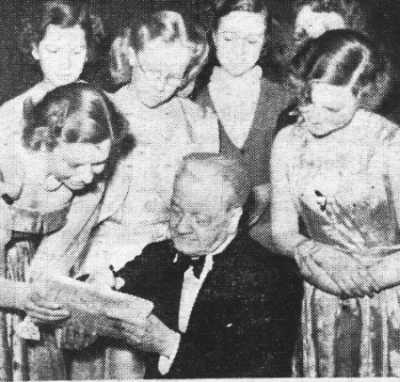
February 17th, 1898
Haydn Wood with Tom Morris, Sybil Maturin and Cyril
Clensy, all pupils of the Royal College of Music, play a quartet
for strings in D major by Joseph Haydn. A critic from the
Musical Times will write: 'This was played by four small
youngsters, of which the College prodigy, Haydn Wood,
was the leader. To see a little fellow who has almost to climb
on his chair lead a string quartet is amusing enough, but to
hear him do it with such a good tone, such unerring technique,
such a rare sense of rhythm, and such assurance is a little
bewildering.'
February 18th, 1921
Haydn Wood assigns to Chappell & Co, London, all the
copyright throughout the United Kingdom of Great Britain and
Ireland, its Colonies and Dependencies, and all Foreign
Countries, of and in the two song-foxtrots entitled Somebody's
In Love With You and Pretending.
February 20th, 1945
Haydn Wood writes to the BBC: 'Last night I listened to the
recorded broadcast of a programme I did last April and I noticed
the pitch was above normal - in fact it was a full half tone in
one number and the average a good quarter one. What I want to
know is, is this done purposely so that the programme does not
over-run? Personally, I find it very disturbing to the ear when,
pianistically speaking, a piece is played between the cracks.
Another reason, the work is a shade quicker than originally
broadcast.' The Recorded Programmes people at the BBC are
actually quite aware of the problem due to the unreliable
electrical supply and the turntable driving system. And, as
Kenneth Wright will specify to Haydn Wood, 'most of our ordinary
electrical turntables are still running on prewar motors which
are deteriorating, but cannot yet be replaced.'
February 21st, 1912
This afternoon (Ash Wednesday), contralto Ada Crossley, assisted
by Haydn Wood, gives a Grand Sacred Concert at the Winter
Gardens, Bournemouth, Dorset. Wood plays a violin obbligato to
Crossley's singing of The Rosary by Ethelbert Nevin.
His violin solo contributions are Sarabande by Joseph
Sulzer, his own adaptation of Listz's La Campanella,
his own La Vie de Bohème, and the last movement of Sonata
in A major by César Franck, in which he is joined by E.
J. Kiddle at the piano.
February 22nd, 1952
The Radio Times publishes a full page article about Haydn Wood
written by Charles Reid. Wood will conduct live the BBC Opera
Orchestra in a programme of his own music on February 26th, in
the Masters of Melody series.
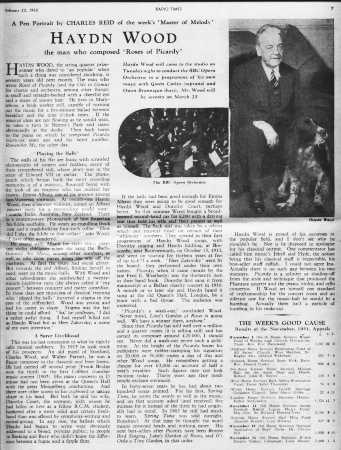
February 25th, 1916
The Era organises a luncheon in honour of the work done by the
dramatic and variety professions all over the British Isles in
the cause of recruiting and war charities. The place is the
Savoy Hotel, London. Haydn Wood and Dorothy Court along with
over 200 performers, are the guests of the public who have an
opportunity of meeting stars of the stage.
February 26th, 1897
Young Haydn Wood takes the final examination for a free open
scholarship at the Royal College of Music, London. He plays on a
3/4 violin by Thomas Perry.
February 27th, 1946
Haydn Wood talks to the members of the Bideford Music Club about
his life and his work, illustrating his talk with excerpts from
his compositions. He plays gramophone records of his piano
concerto, his Variations on an Original Theme, a
string quartet, his Scherzo Fantastique and Mannin
Veen. He also plays his violin concerto accompanied on
the piano by Lily Seton. Edith Mills sings three songs from the
cycle Twelve Little Songs of the Year and the evening
is concluded with a trio arangement with the composer playing
the violin, Nance Littlewood the piano and Edna Rees the cello.
February 28th, 1951
The BBC broadcast Haydn Wood's piano concerto performed by
Wilfrid Parry with the BBC Midland Light Orchestra conducted by
Gilbert Vinter. Wood writes at once to Herbert Murrill, Head of
Music, to tell him how delighted he has been with this
performance: 'I am very grateful to you for giving me an
opportunity of hearing the old work again.' He hopes that the
first performance of Murrill's second cello concerto on March
3rd, will be a great success. And he adds:
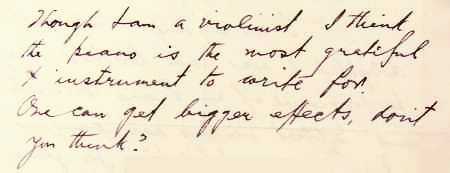
[January] [February] [March] [April] [May] [June] [July] [August] [September] [October] [November] [December]
March 1st, 1924
Haydn Wood agrees that as from the closing of the Copyright
Protection Society on June 30th next, his publisher Chappell
should look after and control the mechanical reproduction of his
works that they published prior to the passing of the Copyright
Act 1911, on the understanding that they will pay to him his
usual share of the Royalties received, less 10 % for collection
and clerical work.
March 2nd, 1933
Haydn Wood assigns to Hawkes & Son, London, all the
copyright, performing right, mechanical rights, and all other
rights whatsoever, in the United Kingdom of Great Britain and
Northern Ireland, the Dominions, the Irish Free State and in all
foreign countries, of and in Manx Tone Poem. This
composition will be published as Mannin Veen "Dear Isle of
Man", A Manx Tone Poem.
March 3rd, 1946
This Sunday morning, Haydn Wood and Dorothy visit St. Mary's
Church, Appledore, North Devon. They are particularly interested
in the method of bell-ringing, and watch the bell-ringers ring a
peal. They attend matins. After thanking the Vicar for the
service, Haydn Wood congratulates the organist on her excellent
playing, and the choir for its rendering of the service.
March 4th, 1953
Haydn Wood with Dorothy attends a concert of the British College
of Accordionists.
March 5th, 1950
Haydn Wood with soprano Gwen Catley perform in the "Our Friends,
the Stars" concert at the London Coliseum, a fundraising for the
benefit of the Songwriters Guild of Great Britain. They are
accompanied at the piano by Lily Seton.
March 6th, 1958
Dorothy Court dies at age 74, at the Middlesex Hospital, St.
Marylebone, London. Soprano Dorothy Court's first appearance on
the London Stage was as Juno in a 1903 production of The
Tempest (Shakespeare) at the Court Theatre. She studied
at the Royal College of Music from 1902 until 1905. She was
known as a concert singer when engaged by the D'Oyly Carte Opera
Company at the Savoy in 1908, to sing leading roles in revivals
of Gilbert and Sullivan's operettas. She joined the J. C.
Williamson Company and toured Australia after she married Haydn
Wood in 1909. Returning to England, she performed with Haydn on
the variety and concert stages until she retired in 1925.
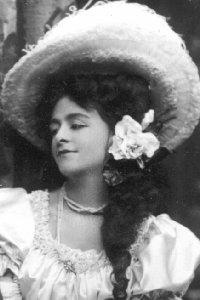
Dorothy Court as Mabel in The Pirates of Penzance (Gilbert and Sullivan), 1908.
March 8th, 1899
Haydn Wood in London sends a telegram to his brother Harry in
Douglas, Isle of Man: 'Carisbrook Castle arrived safely
yesterday all well.' Their brother Daniel has arrived in Cape
Town with Madame Albani and her Company. They are going to give
a series of concerts in South Africa. He will play flute
obbligatos to her singing, as well as flute solos.
March 9th, 1946
Haydn Wood starts one of his bad chest colds which will steadily
get worse. It will be quite impossible for him to travel from
his home in North Devon to London to attend the Performing Right
Society Board of Directors meeting and the PRS Benevolent Fund
Committee meeting.
March 11th, 1956
Haydn Wood is presented with a special Ivor Novello Award for
his outstanding contribution to the concert ballad repertoire.
The event - the first Ivor Novello Awards - is organized by the
Songwriters' Guild of Great Britain at the Theatre Royal, Drury
Lane, London. It is broadcast on television by the BBC.
March 12th, 1924
Haydn Wood assigns to Chappell & Co., London, all his rights
in the mechanical reproduction in the Dominion of Canada of his
compositions published by them prior to January 1st, 1924.
March 14th, 1947
Haydn Wood gives to the Manx Museum Music Library his original
manuscript and two printed copies (high and low keys) of his
setting of T. E. Brown's poem I Bended Unto Me a Bough of
May. Thomas Edward Brown (1830-1897) had a great love of
his native Isle of Man and its people and he expressed this
through his poetry.
March 17th, 1923
Haydn Wood assigns to Chappell & Co., London, all the
Copyright throughout the United Kingdom of Great Britain and
Ireland, its Colonies and Dependencies, and all Foreign
Countries, of and in the eight songs entitled Little Yvette,
I Bring You Joy, Dear Hands That Gave Me Violets,
Wonderful World of Romance, May in My Garden,
Little Girl Waiting at Home, I Love Your Eyes of
Grey, Fairy Waters to be published together
under one cover in the Portrait Album series.
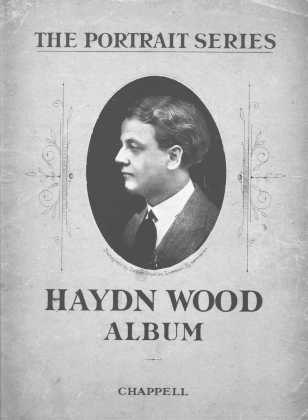
March 18th, 1950
Haydn Wood sends to Douglas Lawrence, Light Music Supervisor at
the BBC, a cutting from last night's Evening News about Queen
Mary's Garden. There is to be a ceremony there on April 25th.
Wood writes: 'If there is a suitable orchestra available that
day how about asking the conductor to include in his programme Queen
Mary's Garden, Regent's Park from my suite Snapshots
of London. It would be a topical item.' After checking
the scheduled programmes, Lawrence will answer that of the five
orchestras which are broadcasting for the Light Programme on
this day 'not one is of an orthodox nature suitable to perform
this composition.'
March 19th, 1937
This afternoon, Haydn Wood is the guest conductor of the
Municipal Orchestra at the Winter Garden, Eastbourne, Sussex.
Among other items, he conducts his violin concerto in A minor
with Joseph Shadwick at the violin.
March 22nd, 1936
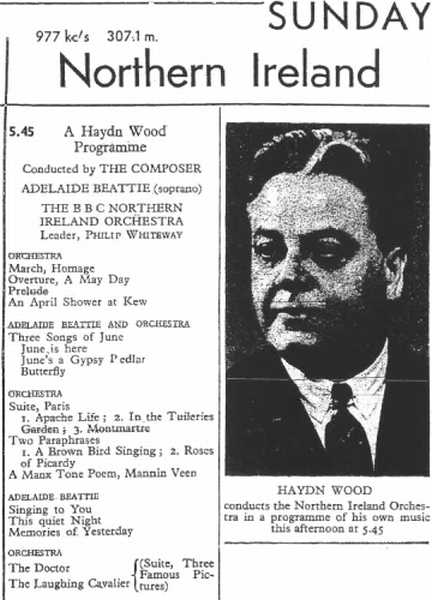
The Radio Times, 20 March 1936.
March 23rd, 1909
Haydn Wood marries Clara Dorothy Court at the St. Mary's Church,
Westerham, Kent. The bride is attired in a Princess gown of
crepe de chine, trimmed with Mechlin lace, and also wears a veil
of Brussels net, with wreath of orange blossoms. She carries a
bouquet composed of gardenias, lilies of the valley, and white
heather, and wears a gold watch bracelet, both the gifts of the
bridegroom. The ceremony is performed by the Rev. S. Le
Mesurier.
March 25th, 1882
Haydn Wood is
born at the Lewisham Hotel, Slaithwaite, Yorkshire.
March 27th, 1939
Haydn Wood sends an obituary notice of his brother Harry to the
Performing Right Society. He would be glad if they would include
it in the next issue of their Gazette. Harry was on old member
of the Society and died on December 25th last.
March 28th, 1952
Haydn Wood thanks the staff of the Performing Right Society, and
the Light Music Section at the BBC, for their good wishes for
his 70th birthday.
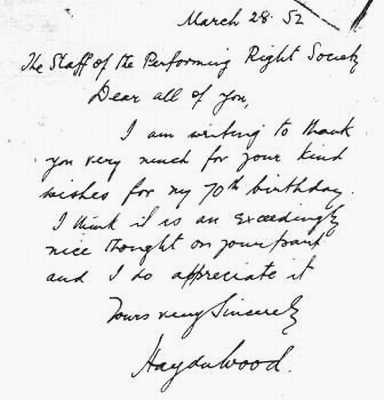
March 29th, 1949
Haydn Wood assigns to Schott & Co., London, the copyright in
his composition Fantasy for string orchestra for the
United Kingdom of Great Britain and Ireland, its Dominions,
Colonies and Dependencies and in all Foreign Countries and their
Colonies and Dependencies. And he pays Schott £50 towards the
cost of production of the printed score and parts.
March 31st, 1938
Eric Coates, Montague Phillips and Haydn Wood appear as
representatives of British Light Music at the Bath Music
Festival. They conduct the Pump Room Festival Orchestra in
examples of their compositions. Wood conducts the first concert
performance of rhapsody King Orry, the overture Apollo,
the suite Cities of Romance and the orchestral
paraphrase of the song A Brown Bird Singing.
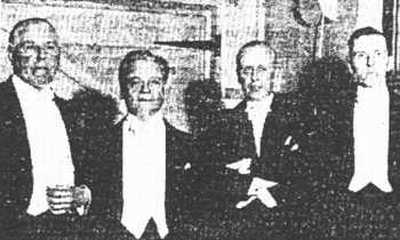
Left to right: Montague Phillips, Haydn Wood, Eric Coates and Maurice Miles, Bath's Musical Director.
[January] [February] [March] [April] [May] [June] [July] [August] [September] [October] [November] [December]